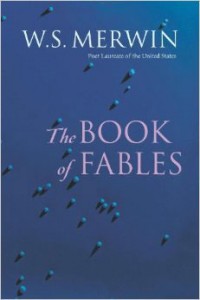
Over the years the books I have come to call favorites always produce an important initial reaction: they make me stop reading. First, a very good book causes me to set it down in the middle of a passage, because I’m thrilled by the ideas it contains. I find myself getting up and pacing the house with a dumb grin on my face, as if trying to squeeze its substance through my system by action of muscle and lung. Pretty soon, I’m closing the book again, inspired to get back to my desk and write.
The Book of Fables, by W. S. Merwin, was an unexpected favorite, the gift of a friend who’d been nudging me toward poetry for a long time. I’d ducked the genre for most of my adult life, though I had previously encountered Merwin’s verse and translations. The Book of Fables, however, is neither. On the long shelf of his work, it is a collection of anomalies. Fables is loosely described as prose poetry, though this term mostly warns that the pieces within are not lineated verse. But that doesn’t mean the—let’s call them stories—lack any of the author’s celebrated elegance, fluidity, or, importantly, his sense of wonder. Some of the stories could be true, others may be fiction, and some seem to span the territory in between.
In Fables, his writing is part enlightenment and part gateway drug, and its led me deeper into poetry while also pushing my own work in fresh directions. With each reading, the book reminds that wonder, as an ingredient in storytelling, need not diminish the purpose or earnestness of a piece, or dilute its questions. Wonder may do more to carry meaning than all statistics and facts, all explanations, all bare honesties, which is sometimes hard to hold in mind in the nonfiction world where I usually work. Fables is also proof for me that a favorite book is often inseparable from the friend who leads you to it. Both turn over what you know. Both arrive telling of wonderful things, and then hurry you out the door in search.

